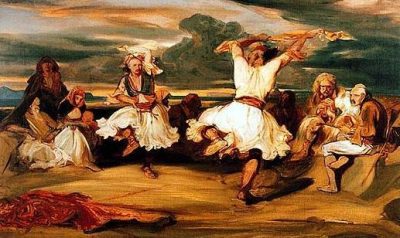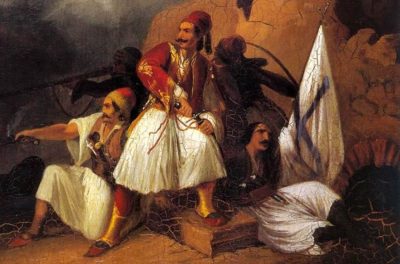120 Greeks stop 8,000 Turks at the Inn of Gravia

A total of one hundred and twenty men joined hands in the tsamiko dance and, within minutes, had turned the inn into a fortress. They blocked the openings and opened loopholes.
May 8, 1821. One hundred and twenty Greeks, led by Odysseas Androutsos, stood their ground—barricaded inside the Inn of Gravia—against Omer Vryonis’ 8,000 Turks, and managed to halt them, killing and wounding around 1,000 Turkish soldiers.
Earlier came the Battle of Alamana, a crushing defeat for the Greeks that endangered the Revolution in Central Greece and the Peloponnese. After his victory, Omer Vryonis planned to descend into the Peloponnese to strike at the heart of the Greek Revolution—first clearing the rebellious regions.
The martyr’s death of Athanasios Diakos had left the insurgent rayahs without a capable leader. Fear gripped the already rebellious centers (Livadeia, Salona/Amfissa, and Attica), where blood of local Turks had been shed. Everyone expected the pitiless wrath of the two pashas to break upon them. The Revolution was in serious danger a month after its outbreak—and it was saved thanks to Androutsos’ military skill and Omer Vryonis’ miscalculations.
The events
Before setting out from Trikala on his campaign against the Peloponnese, Omer Vryonis ordered his loyal captains of Western Greece to gather at Gravia, Fokida, where he would take them along as he passed. He sent a special messenger to Odysseas Androutsos to announce Athanasios Diakos’ death and to tell him that, if he came to Gravia with the other captains, not only would he forgive him for the killing of Hasan Bey Gekas, but he would also grant him the armatoliki of Liakura (Parnassus).
On May 3, 1821, Odysseas Androutsos reached Gravia with Kosmas Souliotis, Efstathios Katsikogiannis, and a band of about 100 men. He immediately grasped the situation and urged the revolutionaries that they must, at any cost, stop the enemy’s advance right there.
After other captains gathered at his invitation, Androutsos proposed that they shut themselves in the Inn, so that—unable to retreat—they’d be forced to fight to the last to block Omer Vryonis’ progress.
But neither Panourgas nor Yiannis Dyovouniotis agreed. In the end, they split into three detachments. One, with Panourgas and Dyovouniotis, took the heights of Chlomos to the left of the road. Another, with Kosmas Souliotis and Katsikogiannis, took the heights to the right. Those who wished would barricade themselves with Odysseas Androutsos inside the Inn. To embolden them further, Androutsos called his men to dance and led a tsamiko. Yiannis Gouras seized the kerchief first, then Papandrias, Komnas Trakas, Angelís Goviοs, the Kapogiorgai, and others. In all, one hundred and twenty men joined the dance and, within minutes, had turned the inn into a fortress. They blocked the openings and opened loopholes.

The battle
As soon as Omer Vryonis arrived—having driven off the detachments of Panourgas, Dyovouniotis, Souliotis, and Katsikogiannis—he realized what was happening inside the inn and grew furious. After the Turks encircled the area and the inn, he sent Hasan the dervish to tell Androutsos to surrender. Androutsos refused; the negotiation turned to insults, and the dervish fell dead from Androutsos’ shot. That gave the signal for battle.
The Turks assaulted the inn but were repulsed with heavy losses and forced to withdraw. The first charge was thrown back—then the second, and the third. Seeing his men fall under the Greeks’ fire, Vryonis ordered cannons brought up to blow the building apart. The Turks halted the assault until the artillery arrived, while the Greeks—who grasped their intent—late at night toward dawn, having fought bravely and killed over 300 Turks while delaying the enemy’s advance, managed to slip out of the Inn secretly, passing between the Turkish lines. Their daring breakout cost them only six dead.

Consequences of the battle
Turkish casualties were heavy: over 300 dead and 600 wounded within a few hours. The Greeks lost only six fighters. The strategic success of this battle was considerable. It prevented Omer Vryonis’ descent into the Peloponnese and facilitated the victory at Valtesi, which energized the Revolution. In fact, after the battle at Gravia, Vryonis was so shaken that he decided to pause his campaign and withdraw to Euboea, to later rendezvous with Kiose Mehmet’s forces.
Thus the descent of such a powerful army into the Peloponnese—where the Revolution had not yet been consolidated—was hindered, while the outcome also contributed to the opening of the struggle in Western Greece.
Dedicated to the guide who works with exceptional diligence at the Inn of Gravia and stands as a model of hospitality.
Source: www.news247.gr

